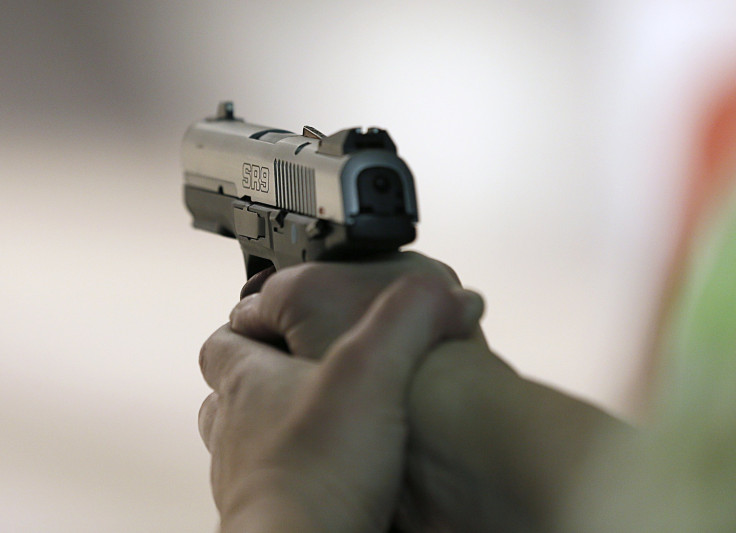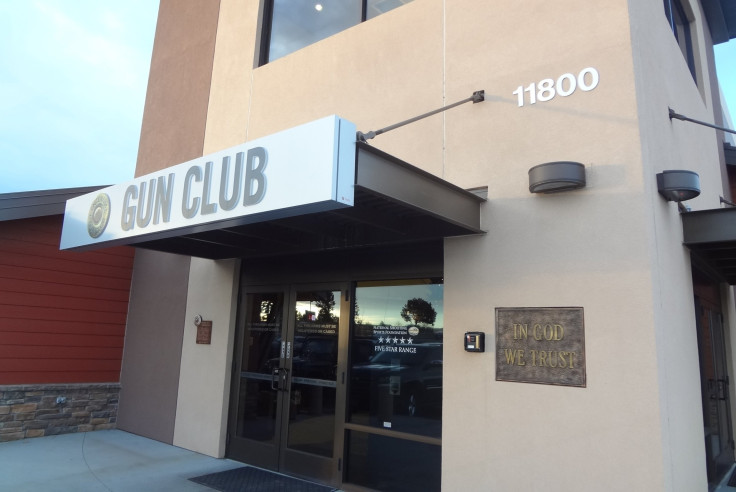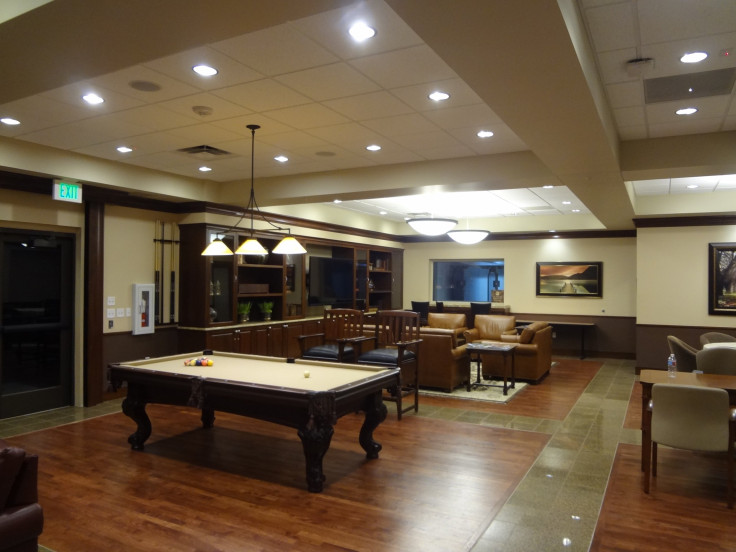As Gun Control Rhetoric Rises, Shooting Range Patrons Worry About Losing Rights – And Their Fun

CENTENNIAL, Colorado -- Marc Rabinoff lines up the paper target in the sites of his Wilson Combat 9 mm handgun and squeezes the trigger. “I love doing this,” he says as the shot echoes around the shooting range. “It’s a great feeling when you hit that target. It’s an accomplishment.”
Rabinoff is engaged in target practice in one of eight V.I.P. lanes at Centennial Gun Club. At 35,000 square feet, the $10 million, 2-year-old facility is Colorado’s largest shooting range and among the biggest in the country. It offers the sort of upscale amenities that have led some to label it a "guntry club." Patrons can rent a sleek boardroom for corporate gatherings. The 5,000-square-foot gun shop offers “Gun Tote’n Mamas” concealed carry purses and other items marketed to women, who make up 35 percent of the operation’s clientele. And Rabinoff pays a hefty membership fee to frequent the Statesman’s Lounge, an exclusive section of the range -- accessible via a retina scan -- where professional athletes and other luminaries enjoy private lockers, a cigar bar, a pool table and a private shooting range.

Lately, business at Centennial Gun Club has been booming, as it has at other shooting ranges nationwide. Ever since the terrorist attacks in Paris last month, the gun club has been welcoming roughly a thousand people a day on the weekends and 600 daily during the week. That amounts to 30 percent more traffic than usual. And this week, CEO Richard Abramson says he’s received three calls from local corporations that are interested in security training classes.
“I’ve never had those calls before,” says Abramson. “I think we are seeing a lot of people buying guns out of fear.”
Never mind that Colorado is still reeling from a shooting at a Planned Parenthood clinic in Colorado Springs late last month. The incident left nine people wounded and three dead. The state was already known for two of the country’s worst gun massacres: the 1999 Columbine High School shooting and the 2012 Aurora movie theater shooting. Never mind that over the past few days President Obama and a front-page New York Times editorial suggested the answer to such bloodshed was less civilian access to firearms, not more. And never mind reports that the San Bernardino attackers frequented shooting ranges, which suggests that some of these operations could be used to train potential mass killers. As in the rest of the country, where gun sales have reached record highs, more people than ever in Colorado are embracing the world of firearms. And in places like Centennial Gun Club, they’re finding that guns offer not just protection but also escape, empowerment and, above all, personal enjoyment.
The situation hints at the difficulties ahead for those who aim to restrict gun ownership in a nation of approximately 100 million gun owners: How do you implement gun control when you’re not just talking about taking away attack weapons but also an integral part of many people's lives?
Zen of Shooting
Rabinoff first picked up a firearm three years ago, after a lifetime of being afraid of guns. One of his sons was enrolled at Columbine Middle School during the 1999 mass shooting, and his other son nearly attended the 2012 “Dark Knight Rises” midnight movie screening where James Holmes killed 12 people. They encouraged their father to look into defending himself. Little did they know just how thoroughly Rabinoff, a retired sports and human performance professor and self-described “liberal Democratic New York Jewish kid” would become enmeshed in gun culture. Now, he shoots at the Statesman’s Lounge several times a week, has taken nearly all of the Centennial Gun Club’s many training courses and is armed with his Wilson Combat 9mm, with a bullet in the chamber, wherever he goes. His wife, Diana, has become a gun aficionado too; she has a pink camouflage AR-15 semi-automatic rifle, and they both compete in a variety of shooting matches each month.
“This is what we wanted to do with our retirement,” says Rabinoff with an accent that hints at his years growing up in the Bronx. “Other people take trips around the world. We shoot guns.” Shooting is something they can enjoy together and with like-minded friends, like playing tennis without having to worry about the weather or skiing without bothering with long winter drives into the mountains. But it’s also the ultimate calming activity, they say. All their minor troubles melt away when they’re looking down the sites of a locked-and-loaded weapon. “When I come here, I have to concentrate,” says Rabinoff. “You are not allowed to be distracted.”

Finally, in a world where technology has made nearly everything easy and convenient, there’s something galvanizing for them, something intoxicating, about the ultimate responsibility that still comes with properly handling a firearm. “You take the gun out of its holster, you point the muzzle and you pull the trigger – it is 150 percent you,” says Rabinoff. If you don’t know how to use a gun, it’s a pretty dangerous tool. If you know how to use a gun, it’s a great tool.”
Knowing that they’re armed and properly trained in something so formidable and deadly when they go shopping or out to dinner is a potent feeling. “I feel empowered when I walk through the mall,” says Diana. “It’s just addictive, that’s what it is.”
These aren’t the only reasons people fill Centennial Gun Club’s 28 firing lanes day after day, honing their skills far beyond simple practical purpose. Some are drawn to the historical aspects of gun culture, including Bart Miller, the range’s head gunsmith, who’s quick to show off his prized 400-year-old Japanese matchlock musket, his oiled, calloused hands tracing its intricate etchings of bounding rabbits and samurai helmets. Others come for the social opportunities, like those who flock to the ladies night gatherings that draw 100 women a month. And still others come with a sense of responsibility, a belief that the Second Amendment isn’t just a privilege, but a duty. It’s why 500 people have recently been attending a church security training course at the range.

Since the San Bernadino shooting last week, however, the Centennial Gun Club’s management has been concerned about another potential reason for folks visiting the range: practicing for nefarious purposes. “It’s absolutely a concern,” says CEO Abramson, a soft-spoken, genial fellow. He notes that according to the U.S. State Department, visitors from certain countries aren’t allowed to visit shooting ranges, and his operation collects identification from everyone who shoots there. Still, he says, “I am talking to our local sheriff about what additional screening can be done. We don’t have a good answer right now, but we are certainly looking into it to see what options there are.”
Bridging the Divide
For people like Rabinoff and his wife, it’s not just that gun control advocates want to restrict their access to firearms, it’s also that these outsiders don’t know the first thing about the gun culture they’re so concerned about – nor do they attempt to learn about it. Rabinoff bristles when folks confuse gun clips and magazines, mistakenly call an AR-15 an assault weapon, and act like having a thousand rounds of ammunition in your house is unhealthy. (Rabinoff and his wife easily burn through that much in a typical month of competitive shooting.) He hates that people like Michael Bloomberg and Oprah Winfrey say he shouldn’t be able to defend himself, when they’re protected by a phalanx of armed security. And he’s frustrated by gun violence measures that position gun owners like himself as a liability rather than a resource. That includes the creation of gun-free zones that he thinks do nothing other than make such locations “soft targets,” as he puts it, for violent extremists.
While he shoots for the fun of it, the polarization of the gun debate has impacted Rabinoff’s personal politics. He won’t vote for Obama, Hilary Clinton or anyone else who’ll “take away our right under the Second Amendment of the Constitution to protect ourselves.” And while he doesn’t agree with every position espoused by the National Rifle Association, he’s now a card-carrying NRA member because “they’re the only ones doing the work in Congress to keep my rights.”

And while he believes proper firearms education is of utmost importance – he’s offered to pay for people’s training classes when he heard they purchased a gun without learning how to properly use it – his frustration with the government’s handling of gun issues has reached the point where he’s against federally mandated firearm training. “I don’t trust the government to come up with how much training you have to have,” he says.
Bridging the divide, culturally and politically, between pro- and anti-gun advocates might therefore seem impossible. But Rabinoff is at least willing to give it a shot. It’s why he’s happy to open up about his newfound love of guns to anyone who will listen. It’s why he’s more than happy to bring guests into the exclusive confines of Statesman’s Lounge and let them take a few shots with his $4,000 handgun, letting them feel for themselves the difference between firing one of his preferred polymer-coated bullets and the standard full metal jacket variety.
As the casings fly and the smell of gunpowder fills the air, Rabinoff grins infectiously.
“You gotta admit this is fun,” he says.
If folks on the other side of the gun debate are willing to admit that, maybe there are other things they can all agree on, too.
© Copyright IBTimes 2025. All rights reserved.






















